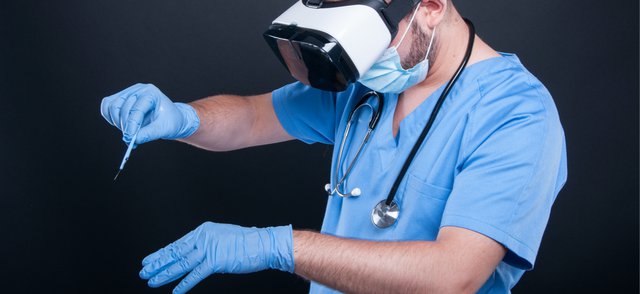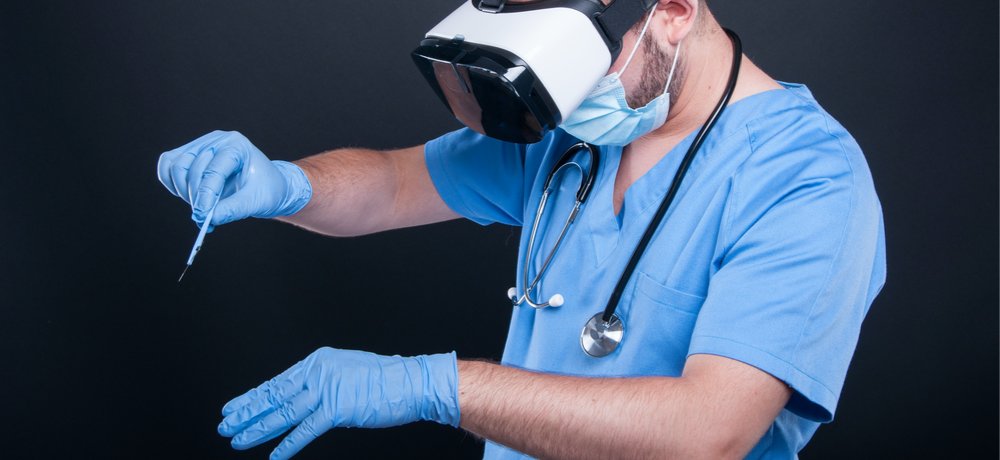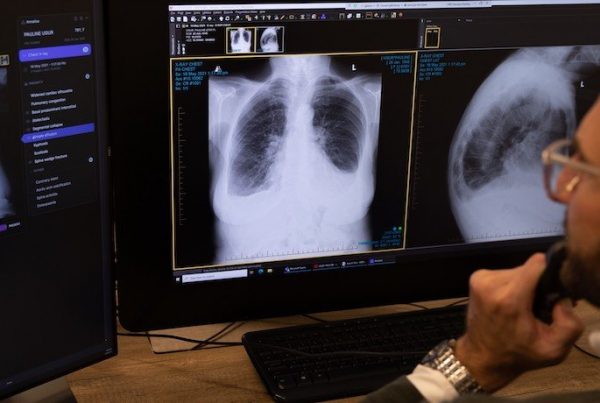Roshan Shetty, VP and head of healthcare and life sciences, EMEA at Infosys, explores the revolution in medical training during COVID-19.

In 2009, a Halifax-based professor of neurosurgery, Dr. David Clarke, performed the first-ever virtual reality (VR)-based simulated surgery to remove a brain tumour. In 2016, Dr. Shafi Ahmed created another landmark at St Bartholomew’s Hospital in London by live-streaming a colon surgery. For the first time in the history of medical science, a 360-degree camera captured and live-streamed every moment of the surgery making it accessible to a large number of viewers across the globe.
Over the last decade, virtual reality has become a game-changer for the healthcare industry in more than one way. But come 2020 and its adoption rate has seen a massive rise with every hospital or medical university rushing to implement VR applications to train professionals, perform surgery, or provide medical education remotely.
An effective way of training medical professionals
The ongoing global health crisis has crushed hospitals and medical facilities with the herculean task of accommodating the surge of patients amidst the acute shortage of medical professionals. To manage the situation, hospitals have reached out to retired doctors and nurses seeking urgent support. NHS alone has called up 20,000 retired medical professionals.
Not only retired professionals, medical and nursing students are also being called upon as front line workers. In March 2020, over 500,000 volunteers signed up to support NHS in its fight against the pandemic. 5,500 final year medical students along with 18,000 nursing students also joined NHS as front-line worker.
But returning professionals and students must be well-versed in the new digital health narrative. How do you do that when face-to-face training is not possible during a nationwide lockdown? To help out overburdened and under-resourced healthcare organisations, several VR simulation companies have come up with unique solutions that can ease the burden and train medical professionals much more effectively than the traditional training methodologies.
One such company is offering its (VR) medical training system free of cost to NHS, Imperial College London, Oxford University, Edinburgh Medical School, and other healthcare institutes in the UK, US, and Canada. Since March, around 17,000 professionals have been benefited through their animated, web-based training and upskilling initiative.
Breaking the barriers of surgical training
The pandemic has also drastically limited the scope for surgical training. Usually, trainees develop skills by watching mentors. The tests or surgeries are either performed on a live patient or a cadaver. This procedure is not only time-consuming but also risky. The outbreak has also caused an indefinite delay to all the elective surgeries further shrinking the chances of in-person surgical training.
In such a crisis, VR is offering a safe learning environment that can be created for trainee surgeons. These virtually simulated operating rooms can help trainees learn the right techniques and skills, gain valuable experience, and build confidence while constantly receiving feedback from the seniors. Performing surgery on a virtual patient in a simulated environment enables the trainee doctors to apply newly acquired techniques without causing harm to patients or exposing them to the highly contagious virus.
Improved safety during a pandemic
VR also has shown effectiveness in ensuring patient safety during surgeries. According to a recent study, VR training could improve patient outcomes by 83% as demonstrated during a hip arthroscopy in a randomised controlled trial.
Another serious impediment to the training procedure is the inability to create a high-stress environment that is close to reality. With stakes so high, one cannot fully recreate the stress of real surgical practice during training, but with VR, creating such a high stress yet safe environment seems highly plausible. VR combined with analytics can even track, measure and provide quantified data that can give organisations better insight about the preparedness of their medical force which, in such an emergency, is the equivalent of saving lives. Several care centres are already leveraging VR combined with artificial intelligence to inject mindfulness and resilience into their surge response training programs.
To protect frontline workers from the contagious virus, the Imperial College Healthcare NHS Trust in collaboration with Microsoft has devised a mixed reality headset that has resulted in an 83% decrease in the amount of time workers spend in high-risk areas. It is also estimated that 700 PPEs are being saved per ward per week. Another group of front-line staff at the Royal Glamorgan and Prince Charles hospitals are currently evaluating the effectiveness of single-use VR headset in bringing down anxiety levels.
Could VR help in patient rehabilitation?
Researchers from Cardiff University are already working with Cwm Taf Morgannwg University Health Board and Rescape Innovation to find the answer to this question that, if proved, will bring a huge relief to the patients who often have to pay thousands of pounds per night for intensive care beds.
The researchers tried to evaluate the use of VR in recovery and rehabilitation and the result has been positive so far. The technology used in these VR applications tricks the brain into believing in another reality. For example, a patient on a hospital bed is virtually transported to an altered reality where the patient can enjoy an immersive experience of hiking in Machu Picchu or snorkelling under the Pacific Ocean or watching a serene sunset while sipping coconut water on a white sand beach. Called as VR distraction therapy, such virtual experience causes the brain to escape the present reality leading to less pain and anxiety.
This is just the beginning of a technological revolution that can completely transform medical training and care systems. Although the potential of virtual reality is yet to be explored, the pandemic has already made the value of this technology evident. From being a gamer’s technology to be a value addition and impactful teaching aid to healthcare, VR has already come out of its age. All we need is the right infrastructure so that virtual and augmented reality can be fully integrated into the existing systems making healthcare and medical education safer, smarter, flawless, and immersive for both professionals and patients.





